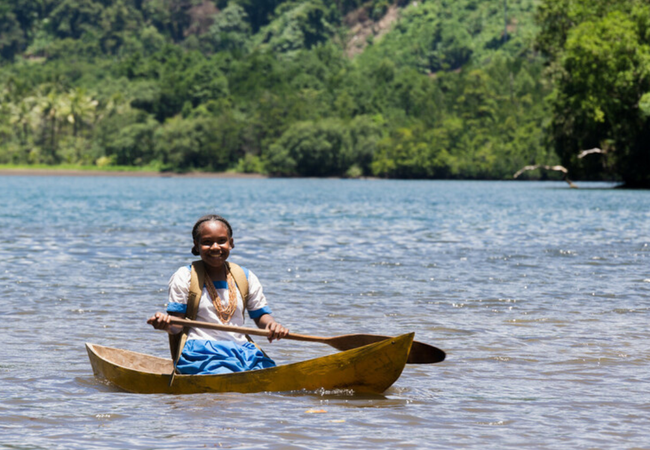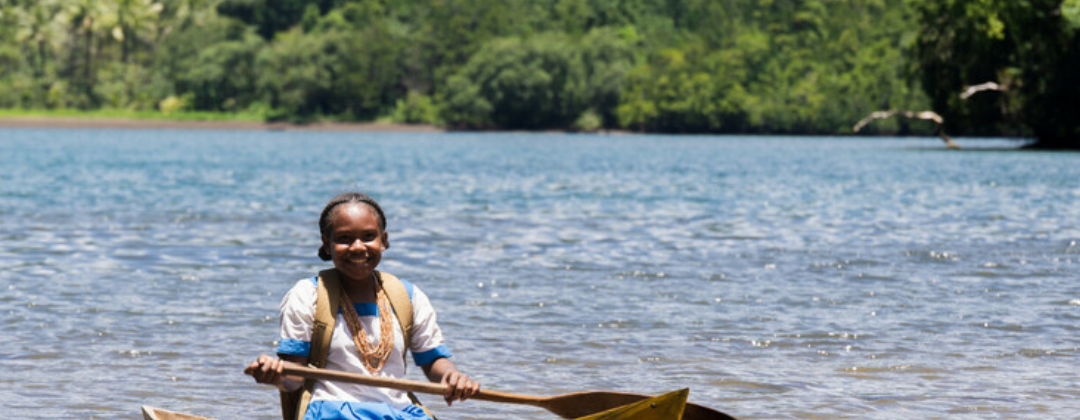


I'm Jamie Livingstone in the United Kingdom
27 Nov, 2023
4 mins read time
The sea is coming: I’m afraid

I'm Jamie Livingstone in the United Kingdom
27 Nov, 2023
4 mins read time
The children of Manawai Bay in the Solomon Islands used to walk to school along coastal footpaths. Those paths are underwater now. The children must go to school via canoe.
It’s not just the paths that have been submerged. The sea has also swallowed land that was once used for planting vegetables; now it’s lapping at people’s doors and threatening the future of the village’s health clinic.
“The sea is coming,” villager Silas tells my Oxfam colleagues, pointing at the vast, encroaching ocean. “I’m afraid. I fear this thing.”
Sea level rise presents an existential threat to countless communities across the Pacific, who face being wiped off the map entirely.
Meanwhile, half a world away, in Somalia, Layla and her family are among the millions of people – many of them pastoralists like she is – who have fled their homes in order to survive years of little rainfall, failed crops and dried up water sources.
It’s projected that 1.8 million children in Somalia will experience acute malnutrition by the end of this year. “It’s getting harder to find something to eat,” Layla explains.
The impacts of climate breakdown are brutally unequal: ordinary people – like Silas and Layla – are the ones pummelled by the worst of floods, droughts, heatwaves and fires, despite having done virtually nothing to cause the climate emergency we all now face.
Culpability is crystal clear. It is rich countries – and richer people within them – who are driving the climate crisis. Oxfam’s analysis reveals that globally, the richest 1% produce as much carbon pollution as two-thirds of humanity: that’s five billion people.
The destructive luxury lifestyles of the richest 1% globally are killing the planet and killing us. The carbon they spewed into the atmosphere in 2019 alone will cost an estimated 1.3 million lives through heat-related excess deaths, roughly equivalent to the populations of Edinburgh and Glasgow combined.
Incredibly, it would take about 1,500 years for someone in the bottom 99% of humanity to produce that level of carbon pollution.
But emissions are unequally distributed within Scotland too.
Data published by Future Economy Scotland shows that an individual’s carbon footprint increases the richer they are – and particularly sharply for the very richest.
In fact, the emissions of someone in the richest 5% of households are, on average, more than four times greater than someone in the poorest 5%. That gap rises to 11 times more when it comes to their pollution from flying.
There would be nothing fair about splitting the costs of climate action equally across society when we know, on average, the richer you are, the more you pollute.
COP28: another crucial climate crossroads
Neither Silas nor Layla will have a place at the table when world leaders gather at the annual UN climate summit – COP 28 – in Dubai later this week to take stock on their collective efforts to limit the damage of runaway human-induced climate change.
But their experiences should provide new impetus for action. And the First Minister is among those who must act.
Like anyone boarding a plane, as he heads to COP, Humza Yousaf must ask himself if all those air miles, and carbon emissions, will be worth it.
The answer must be a resounding yes.
Encouragingly, the First Minister says he’s determined to show climate leadership in Scotland, across the UK – essential given the Prime Minister’s watering down of climate action and green-lighting of new oil and gas licences – and on the world stage, including at COP 28.
Although it is the UK Government that participates in the main UN negotiations, we shouldn’t underestimate the influence that Scotland can have in the international arena.
Scotland co-chairs the Under2 Coalition, a global community of 260 state and regional governments, who represent over 1.75 billion people and 50% of the global economy.
And, of course, at COP 26 in Glasgow, the then First Minister Nicola Sturgeon made Scotland the first country in the global north to pledge funding to address ‘loss and damage’ – the irreversible impacts of climate change now faced by many low-income and climate vulnerable nations.
A year later, at COP 27, all countries agreed to create a global Loss and Damage Fund and at the upcoming talks they need to make it a reality.
The First Minister must now build on Scotland’s leadership by speaking out on another defining issue of justice: how climate action is paid for.
The Scottish Government is already ahead of the curve in backing the principle that polluters should pick up the ever-growing tab for the damage they’ve caused.
Yet it’s not sufficient to talk the talk; the First Minister must walk it too.
Scotland’s own climate conundrum
Good intentions, strong rhetoric and trips to faraway UN Conferences won’t define the First Minister’s climate legacy.
History will instead judge him on whether he steps up, scales up and speeds up the investment required to decarbonise our economy in a way that is both fast and fair.
As it stands: the Scottish Government has a few dirty climate contradictions: with a string of missed emission reduction targets behind it and plans afoot for a new gas-fired power station at Peterhead.
These inconsistencies must be addressed, particularly within the Scottish Government’s upcoming Climate Change Plan, which has another fundamental question to answer: where will the money come from for the transition to net zero? We all know it’s going to be expensive, but who foots the bill is a simple matter of fairness.
The First Minister must reject attempts to turn the climate crisis into a political culture war, and instead drive forward climate action in ways that protect the pockets of already hard-pressed households by making Scotland’s richer polluters pay more.
After all, we already know what needs to happen to reduce our collective carbon footprint. What’s missing is the political courage to bring the money and ideas together.
Oxfam has shown that the UK Government could have raised up to £23 billion last year if it had implemented a series of common-sense taxes on the UK’s biggest polluters – fossil fuel companies and the extremely rich, including taxes on luxury travel, like private jets.
But Scotland shouldn’t wait for the Prime Minister to act.
The First Minister should place climate justice at the very heart of his own tax decisions within next month’s Scottish Budget, through new measures that make richer people, who pollute more, pay more, while incentivising them to clean up their acts.
The seas, and temperature, are rising. The First Minister must too, and rise to the occasion by turning up the heat on Scotland’s biggest climate culprits, before it’s too late.
This article originally appeared in The Sunday Post